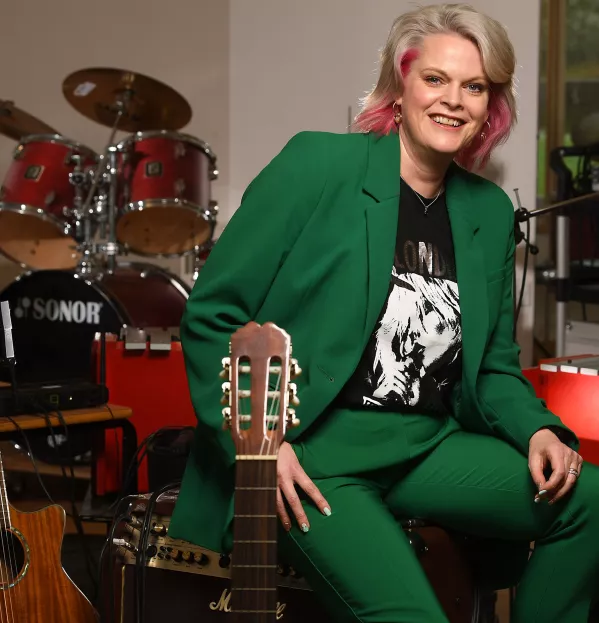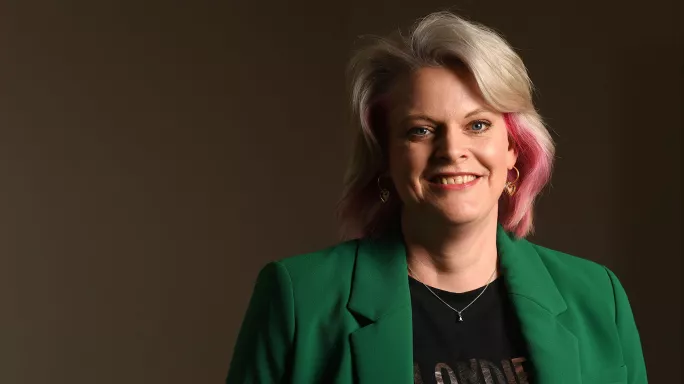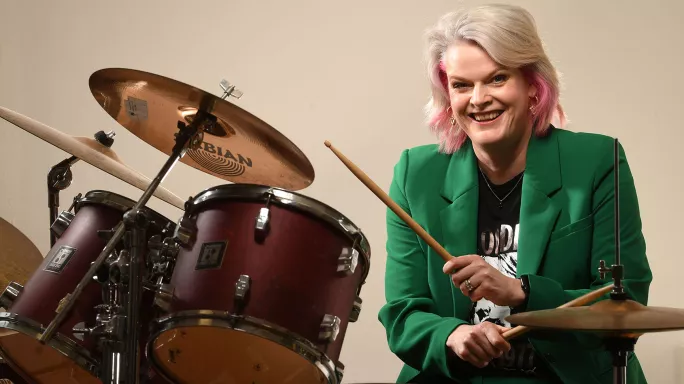- Home
- Leadership
- Staff Management
- 10 questions with...Helen Williams
10 questions with...Helen Williams

Helen Williams is the CEO of INMAT, a multi-academy trust made up of 11 primary schools in Northamptonshire.
She started working in education only after a set of poor A-level results sent her down a very different early career path. But a love of Brideshead Revisited helped her to land a place on a teacher training course and, since then, she’s never looked back.
Williams talks to Tes about what pulled her back to the classroom, how her own experience of schools has shaped her as a leader, what inspired her to become an Ofsted inspector and how the renewed focus on the curriculum has had both positive and negative consequences for primary schools.
1. What was your experience of primary school like?
My prevailing memory of primary school is doing loads of topic work in books that we made ourselves.
These books would have an exciting hand-drawn cover with a beautiful drawing, and be bound together with a hessian spine, and then the pages stitched together.
All the work you did would be linked to a particular topic for the half term, and if you didn’t like the topic, well, you were stuffed!
Until Year 5 I attended a very traditional three-form entry school in Watford, but then in Year 6 my family moved to Northamptonshire and I transferred to a tiny village school with just 12 students, with two pupils in Year 6.
It was a real culture shock, changing from a big school to a small school. All the juniors were taught together and it was great because there were so few of us that if we got stuck the teacher had the time to really go through the problem with you.
In a very small primary it was normal to have friends from different year groups. Doing PE was a challenge: we would have to either push the tables to one side in the classroom or take a walk down the road to use the field behind the local pub.
2. How did that compare with your secondary school?
Secondary I can split into two halves. When I was in Years 7 and 8, everything was fine. I was quite happy; I had made really good friends and I was involved in the choir and drama club. I remember it as being a fun time.
However, things didn’t stay that way. When we got to GCSEs, something shifted and I became the target of a little gang of bullies. Both Years 9 and 10 were horrible. [The bullies] were in my form group - and therefore all my lessons - and isolated me from my friends. It was really tough.
Although I tried to talk to teachers about it, and my mum wrote endless letters to my head of year, nothing was done. It was a different time then and bullying was not discussed like it is now. The problem only stopped when the deputy head, Mrs White, got involved. She was fierce. She dealt with it.
More Tes’ 10 questions...
- Melanie Renowden, CEO of the National Institute of Teaching
- Jonty Clark, CEO of The Beckmead Trust
- Cheryl Giovannoni, CEO of the Girls’ Day School Trust
I got through it by hiding in the music rooms. I’d find an empty practice room and eat my lunch in there. It wasn’t the nicest of times - but it made me who I am now.
Looking back on it, I can see that it has influenced the sort of teacher I am. As an adult, I won’t tolerate bullies in any form - whether that is child bullies or in the workplace.
Now I look back on it, I can see that it was one girl instigating the bullying and the others were swept up in it. I can reconcile her actions as I know that she had difficult things she was dealing with, but it’s taken me a while to get to that point.
From an educationalist point of view, when I see these situations, there is always something else going on. It doesn’t excuse it, but it helps understand it.
3. Did you have any memorable teachers?
The drama teacher and the music teacher, Mrs Mackie and Miss Fielding, would let me tag along to the extracurricular clubs. Even though I didn’t act or play an instrument, they always welcomed me and were happy to see me.
There was an orchestra trip to Austria, and they let me play the cabasa at the back. Both of them always ensured I was included and provided me with a safe place.
One teacher who had a significant impact upon my life was Mrs John. She was one of my A-level English teachers and at the start of the year, she had given us a booklist to read and steered me towards EM Forster and Evelyn Waugh. I read Brideshead Revisited and became obsessed with it.

In the English department there was a video cupboard stacked full of adaptations - including the BBC Brideshead Revisited. I was given the key and allowed to borrow one video from the boxset at a time. I watched them all and I fell in love with [actor] Anthony Andrews.
Mrs John turned me back on to literature again through that book, and she opened a door to the idea that reading can be fully immersive. I’ve read Brideshead Revisited so many times and it has brought me so much joy - and Mrs John has done that for me.
4. What were your exam years like?
Even though the bullying eventually stopped, I switched off in my GCSE years. I got through them with minimal effort - however, the same didn’t apply for my A levels. You can’t wing A levels!
I did English literature, history and geography. I had loved literature at GCSE - but the A-level texts completely switched me off, particularly James Joyce’s Dubliners.
Around that time I also got involved with Young Farmers. When you live in a quiet village, Young Farmers is your social life. I discovered alcohol, I discovered boys, I discovered parties…all through Young Farmers. You’ve not partied until you’ve partied in a field. I blame James Joyce and Young Farmers for my poor A-level results.
I had every intention of doing teacher training, and applied and was offered places - but when the results came out, that wasn’t happening. My results were dire.
5. Why did you choose to work in education?
Because my A levels and school years were a little wayward, I left school and fell into random jobs. My first job was as an estate agent - I wasn’t very good at that. I mean, who would buy a house from an 18-year-old? Then I was a recruitment consultant. At 21 I finally pulled my socks up and applied for teaching training.
I made that decision to change career to teaching because I was completely unfulfilled: recruitment and estate agency are only about sales. I felt like it wasn’t me - nothing was giving me any enjoyment.
So I took a day off work and made a list of teacher training colleges, and rang them one by one. It was soul-destroying. No after no after no.
It got to nearly the end of the day, and I called my friend and told her I felt like giving up. She came over and sat with me, and said: “Let’s just try a few more.” I called Wrexham Institute and they asked me to come in for an interview.
When I arrived they sent me to speak to the English lecturer, as that was the only A-level I had managed to pass.
She asked me to tell her about my favourite book, and I launched into Brideshead Revisited - and it was her favourite book, too! It was serendipity. They took a punt on me and offered me a place.
6. What have been some of your toughest moments?
In April 2017 I joined Ofsted as an HMI, and the reason why I wanted to do it was because I had experience working with an “inadequate” school. When I started there I had felt really cross with the offer and the chances that were available to the children at that time. It was rubbish.
There were good teachers who didn’t know what they were supposed to be doing, and a headteacher who didn’t have a strategic overview about how things should work. Behaviour that they hadn’t pinned down, in terms of what they wanted it to look like. There wasn’t any shared goal or direction.
And it made me so cross as there had been a whole generation of kids who had been failed by that school. And if Ofsted hadn’t been in and graded them as “inadequate”, then that would never have been picked up. That experience was a catalyst for me becoming an inspector myself.

Working for Ofsted is a tough job, but it’s made worthwhile when you’re able to see the progress that an “inadequate” school has made after you’ve been working with it to improve its offer.
And you go into those schools that are not great and for safeguarding reasons or educational reasons, what is happening in the school isn’t right for the kids and you have to put them in a category. Those are tough moments.
7. In your dream school staffroom, who would be your colleagues?
Teaching science, I would have the space scientist Dr Maggie Aderin-Pocock. She’s an inspiration to me in so many ways. I saw her speak at the Bluedot Festival last year and was struck by her determination and enthusiasm for all things.
I’d have to have a huge music department because I would pack the place with musical talent. Tim Burgess would be there. Tim could teach musical appreciation, particularly the lapsed art of how to enjoy a whole album rather than just random tracks.
Lizzo would also have to be enticed into the school, too. Not only is she a fabulous role model, she can also play a mean flute. Who can deny that wouldn’t be an asset in any school?
For PE, Jill Scott would be great. A spectacular athlete but also relatable, fierce and great fun.
Finally, I’d have local boy James Acaster in to teach geography. His local knowledge would be a real asset. Plus, he’d keep even the most jaded of teachers upbeat.
8. What are the best and worst aspects of the current school system?
One of the best things has been the revised focus on curriculum. This has really encouraged the profession to think carefully about what we are teaching and when. It’s also encouraging staff in schools to think beyond their class or year group, and about how what they teach fits into the bigger picture.
The other good thing has been all curriculum subjects get airtime. The arts and creative subjects should no longer be losing out to the core subjects. Well-planned arts curriculums are developing our pupils’ knowledge in these subjects, rather than superficial arts projects bolted on as a tenuous topic link.
Unfortunately, the unintended consequence of this revised focus on curriculum is the over-prescribed approach where every lesson becomes a rigidly planned PowerPoint presentation, which teachers deviate from at their peril.
The worry here is we forget that the strength of our teachers is to do just that - teach. The purpose of a well-planned curriculum is to set out the key knowledge we want our pupils to know and when. If we overly prescribe how teachers present this knowledge to pupils, we are missing the point.
All classes are different. All pupils are different. All teachers are different. We must empower and enable teachers to teach, not just deliver. If that’s all we want teachers to do, we may as well appoint robots.
9. If you became education secretary, what would you change?
While I appreciate it’s not a simple task, we need a better approach to support pupils with special educational needs and disabilities (SEND). We see pupils not getting the right support they need. This is often not the fault of those who working with SEND pupils day to day but rather the structures that exist in the system.
I believe we need to get better at supporting schools and teachers to teach pupils with SEND in mainstream, as well as in special provision.
For that to happen there needs to be built-in capacity in the SEND system to support all our children, with less of a reliance on private provision.
10. What will schools look like in 30 years’ time?
I really hope we will have reached a point where people with neurodiversity no longer have barriers put up to prevent them from thriving.
I shudder to think how many talented individuals are slipping through the net because we are failing to nurture and celebrate talent that doesn’t manifest itself in a manner society deems “normal”.
There are so many advances in technology that should make the barriers that these pupils face negligible, yet in the classroom we are not yet embracing these fully.
A good example of this is assessment. Do we really need all our pupils to sit overly long exams, writing lengthy essays, to show what they know? Are there better ways of doing this?
In the near future I hope we will have a fully inclusive system that supports pupils to show what they know and what they can do, without us adding barriers to success.
Helen Williams was talking to Tes senior analyst Grainne Hallahan
You need a Tes subscription to read this article
Subscribe now to read this article and get other subscriber-only content:
- Unlimited access to all Tes magazine content
- Exclusive subscriber-only stories
- Award-winning email newsletters
Already a subscriber? Log in
You need a subscription to read this article
Subscribe now to read this article and get other subscriber-only content, including:
- Unlimited access to all Tes magazine content
- Exclusive subscriber-only stories
- Award-winning email newsletters



